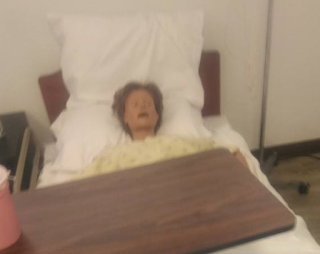 |
| Picture of mannequin in bed taken by Selena at beginning of her CNA course at Utah CNA Centers this past April. |
We are learning a lot about the perks of the world of the Certified Nursing Assistant (CNA). Let us share three important key items that may sway you to begin training today.
First, did you know that you don't have to start your CNA course before you get hired? All you need is basic first aid/CPR certification. The first aid course included a skills test (demonstrate to the instructor that you can perform CPR appropriately) and a short multiple-choice test (which may be read by the instructor).
Second, long-term care facilities will hire anyone to be a CNA. You have 120 days from your date of hire to pass the CNA licensing exam. On top of that the long-term care facility will reimburse you for your CNA course. They'll reimburse you even if you started the course before they hired you. Some long-term care facilities may also give you a signing bonus. Yes, you heard us right. An additional check for just signing up to work for them. Buyer beware: Read the fine print - some of these companies may require that you work for them for six or more months if they pay for the course or give a signing bonus. You may earn as much as $25, 000 per year ($11/hour). Many of the positions, however, are part-time.
Third, while many long-term care facilities need CNAs, so do hospitals, especially hospitals tied to universities. Getting employed as a CNA at a hospital has more benefits. By benefits, we mean that you may actually move up into a tech field with little further education. For example, you can become a cardio tech (the person who performs EKGs), MRI tech (the person who performs MRIs), or ultrasound tech (the person who performs ultrasounds) without a college degree. The average pay for the cardio tech is $53,000 per year ($25/hour), and the MRI tech averages $65,000 per year ($31/hour). While these careers may need additional on-the-job training, CNA may certainly be an entry into these other better paying medical-related jobs. Oh, by the way, as a university employee, the CNA may also get reduced college tuition.
We have been quite surprised by all of this. We know that CNAs are the backbone of any medical facility, but we didn't realize how CNAs might move easily into other better paying positions. Based on what we've shared, aren't you ready now to get your CNA?
No comments:
Post a Comment